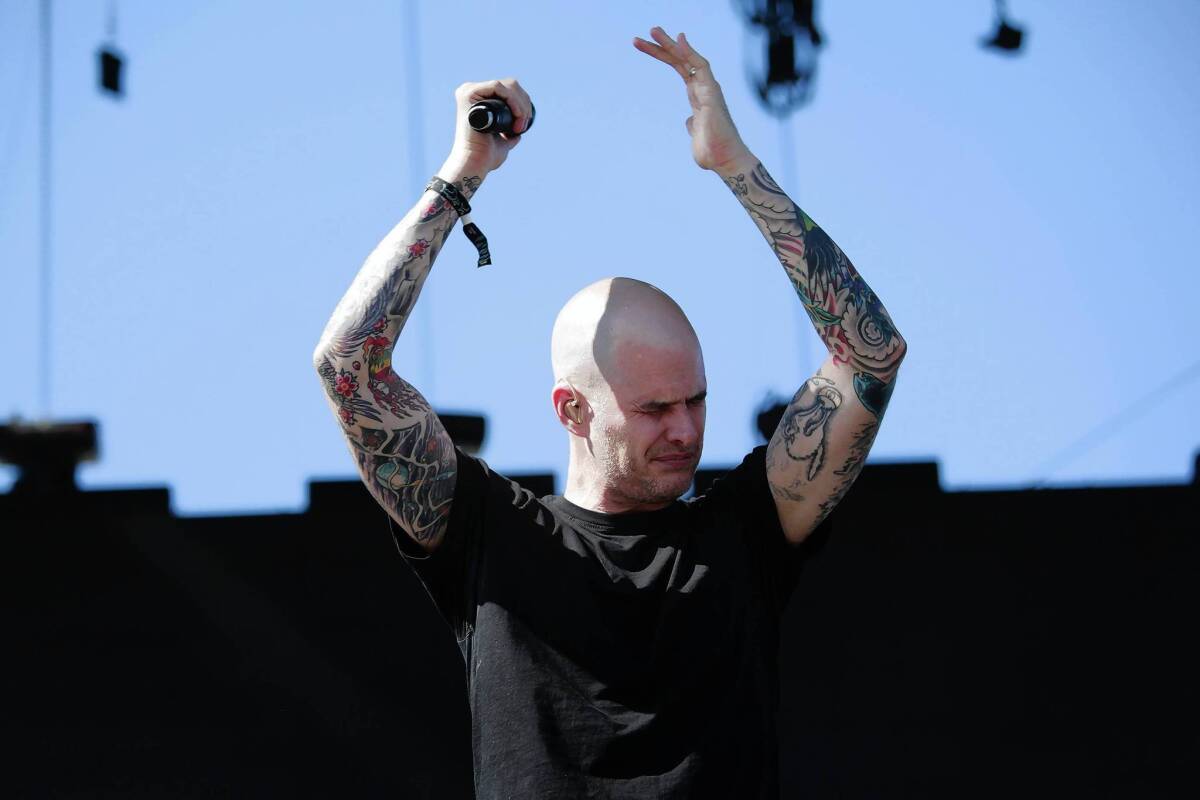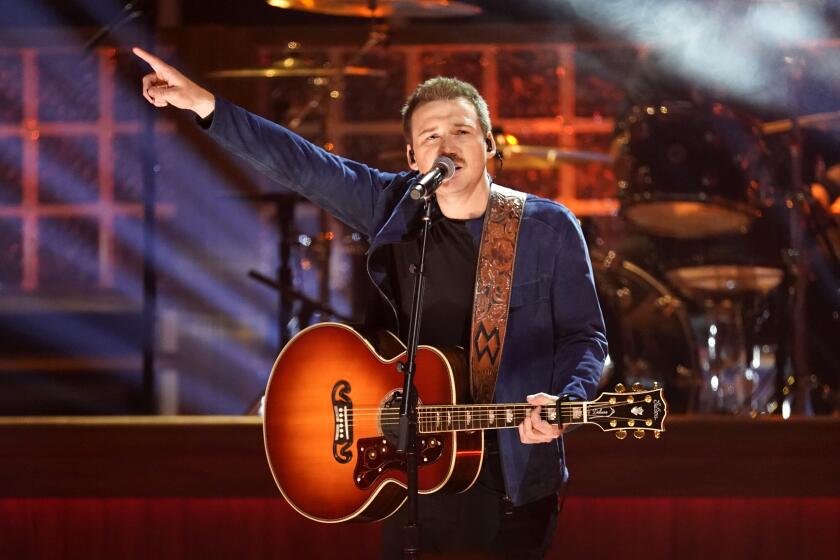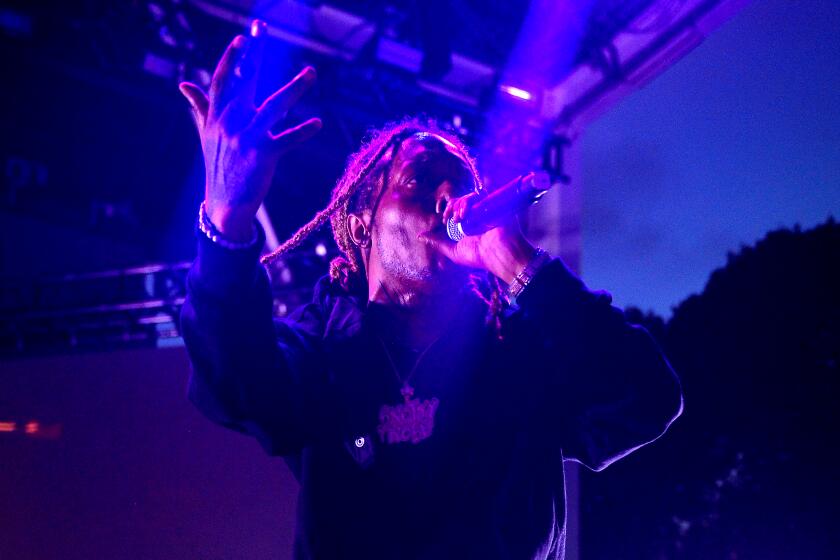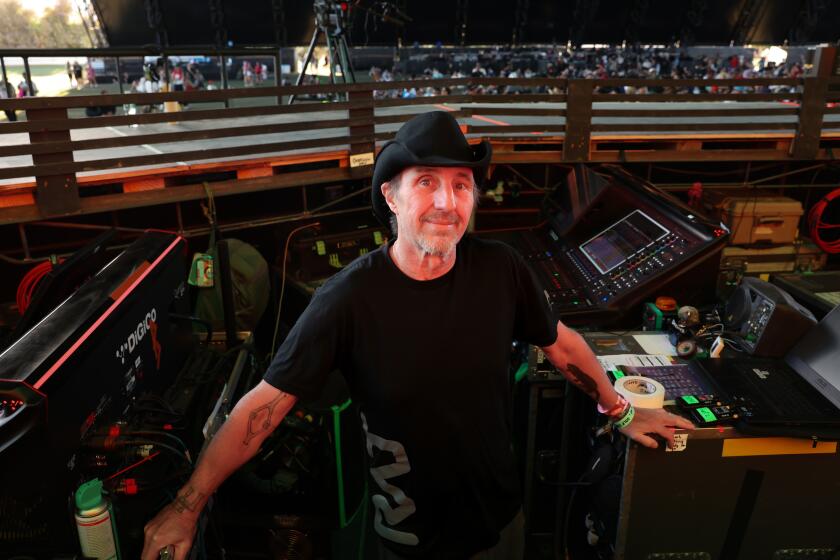Coachella 2013: The music goes on, but for what purpose

The Coachella Valley Music and Arts Festival is considered one of the music industry’s premier festivals, connecting the dots between musical generations and genres with a diverse lineup that attracts fans from around the globe. But the festival, which cloned itself into two weekends starting last year as a way to deal with its capacity crowds, seemed anything but connected with the rest of the world when it ended its 2013 run Sunday.
In the four days between its two-weekend run, two bombs went off at the Boston Marathon, killing three and injuring scores more. Yet Boston’s Dropkick Murphys, which considered dropping off the bill to go home to friends and family, was perhaps the only band to reference the incident from the festival’s main stage Saturday afternoon, injecting a sense of reality into the otherwise carefree fairgrounds.
The band grappled with how to bring current events into its set and thanked the crowd for “showing so much support for the people of Boston,” words that drew some of the biggest cheers of the weekend. The band stopped short of asking for a moment of silence, which it had debated.
COACHELLA: Festival photos since 2004 | Weekend 2 photos | Day 3 photos
“We know people are here to party, and we don’t want to rain on anyone’s parade,” said bassist-singer Ken Casey after his set. “It’s nice, though, if even in a situation like this people can acknowledge the more serious elements of society and how fleeting life can be — how crazy life can be.”
But Coachella is so far from unpredictable these days that entering the Empire Polo Grounds where the 14-year-old festival takes place can almost feel like entering a protective bubble. It hosted 180,000 attendees over its two weekends, yet badge holders who arrived for the second run of the event Friday were greeted with everything but the unexpected.
Competing with a Ferris wheel, art installations that included a giant iridescent snail and myriad food booths (Ruth’s Chris Steak House, anyone?) was an artist lineup that boasted headliners Blur, the Stone Roses, Phoenix and the Red Hot Chili Peppers. It was the same roster as Weekend 1, playing the same set times (save for a Friday night switch between co-headliners Blur and Stone Roses). And to make sure nothing went askew, many acts played almost the identical set list they had the week before.
Those who made the mistake of watching Coachella’s live YouTube performances that were available during Weekend 1 saw much of the same show go down with theatrical consistency this past weekend. Blur’s frontman Damon Albarn seemed to sum the situation up well when he sang with ho-hum dissatisfaction in his band’s “Death of a Party”: “Another night, and I thought, ‘well, well.’”
When Coachella began more than a decade ago, the festival was not only more affordable than its current $379 weekend-pass-only incarnation, but it was something of a statement. It was proof that underground dance and independent music could draw thousands and had an audience that was underserved. It was also proof that risks paid off.
PHOTOS: Desert Chic | Week 2 highlights
But as the geek has become the mainstream, Coachella promoter Goldenvoice finds itself trying to have it both ways. The company, once an independent L.A. upstart that is now owned by AEG, is trying to cater to a more mainstream crowd while also trying to maintain the curatorial nature that adventurous music fans demand.
That tricky balancing acts signifies what could be a prolonged struggle for Goldenvoice in the years to come, as the promoter recently inked a 17-year deal with Indio to keep Coachella in the desert city through 2030. Perhaps that’s why the moments that truly stood out felt more sporadic than ever, and, in the case of Blur and the Stone Roses, were witnessed by smaller crowds than Saturday’s headliner, Phoenix.
Blur, in songs such as “Girls & Boys,” dipped into rave culture, and then crafted something more akin to a hymn in “Sing.” The Stone Roses turned songs such as “Fool’s Gold” into live remixes, working in the Beatles’ “Day Tripper” and concocting a groove that, like the DJs in the pimped-out electronic dance tent the Sahara, was meant to be felt and not watched.
On Saturday Parisian pop rockers Phoenix channeled the pre-punk disco-era with bright synths — the ascending, descending notes of “Trying to be Cool” and the Far East inflections of “Entertainment” could be sing-alongs for years to come. Earlier in the dance tent, country mates Birdy Nam Nam’s highly orchestrated beats made it seem as if the act were reenacting the soundtrack to a spy movie, at one point even turning the sound of dripping water into a groove.
Jehnny Beth, the ferocious lead singer in the venomous punk quartet Savages, let her arms do the talking and her voice do the hollering. At times she was seen gripping the microphone as if it were the only thing keeping her standing, and other times she was taking a step back as if she wanted to challenge the audience or anyone who would dare come in her way.
The day after her set, she said of Coachella, “I got to meet a lot of the artists I grew up with — the artists whose vinyl I was buying when I was 14,” noting she was pleased to meet Fugazi members Ian MacKaye and Brendan Canty, each here with separate bands.
Yet for the second weekend in a row, the biggest buzz was an artist not in attendance: Daft Punk. A rumor had been circulating that the Parisian dance act would drop into the otherwise set-in-stone lineup and guest with band Phoenix (R&B crooner R. Kelly had dropped in for Weekend 1). Daft Punk gave a Coachella performance for the ages in 2006 and fans have wanted it back since.
But it wasn’t to be at Coachella 2013.
Pity poor Phoenix, which has a new album in “Bankrupt!” that could very well be the pop album of the summer, yet a small faction of the crowd began booing when Daft Punk failed to show for a second week in a row. Last week’s attendees got R. Kelly, while this weekend’s concertgoers were left wanting more.
The festival was fortunately tame in other ways. This year Indio police tallied 52 arrests for the first two days of Coachella, most of them alcohol- or drug-related, and one for someone trying to create counterfeit wristbands.
Despite the Boston attacks, Indio police did not change much of its security plan. “There’s always been heightened security,” said spokesman Ben Guitron, adding that recent events are just a reminder to be “vigilant.”
In 2011, Goldenvoice began using microchip-embedded wristbands to avoid counterfeiters. While a move to protect its brand and business, Guitron said it has paid off for security as well. Guests, for instance, are scanned multiple times before entering the grounds. No one, either concertgoers or homeowners, can so much as get within a mile of the Empire Polo Field, where Coachella is held, without wearing one.
Fans who said they were worried Coachella would ramp up security were pleased. “It’s a party,” said Coachella attendee Jesus Llamosus, 23. “People have been expecting this for months. Getting in was easy. They asked if I had any guns. No. No. No. No. Just kept saying no.”
As the 2013 edition of the festival wound down, one-man band Robert DeLong challenged Sunday’s tired and the sun-scorched crowd with his current events song “Survival of the Fittest,” which melds dance floor hysterics with a hip-hop soul. He referenced guns in elementary schools, corrupt politicians and a blind allegiance to religion and oil.
“Does this change how you feel,” sang DeLong in the following song, who then paused and added, “about anything?”
DeLong had a sizable crowd, but it’s telling, perhaps, that the crowd gave a more vocal response to a question from Brian Moen of old-timey rhythm & blues act Shouting Matches on Friday. “Anyone been on the Ferris Wheel, either psychedelically or metaphysically?”
More to Read
The biggest entertainment stories
Get our big stories about Hollywood, film, television, music, arts, culture and more right in your inbox as soon as they publish.
You may occasionally receive promotional content from the Los Angeles Times.







